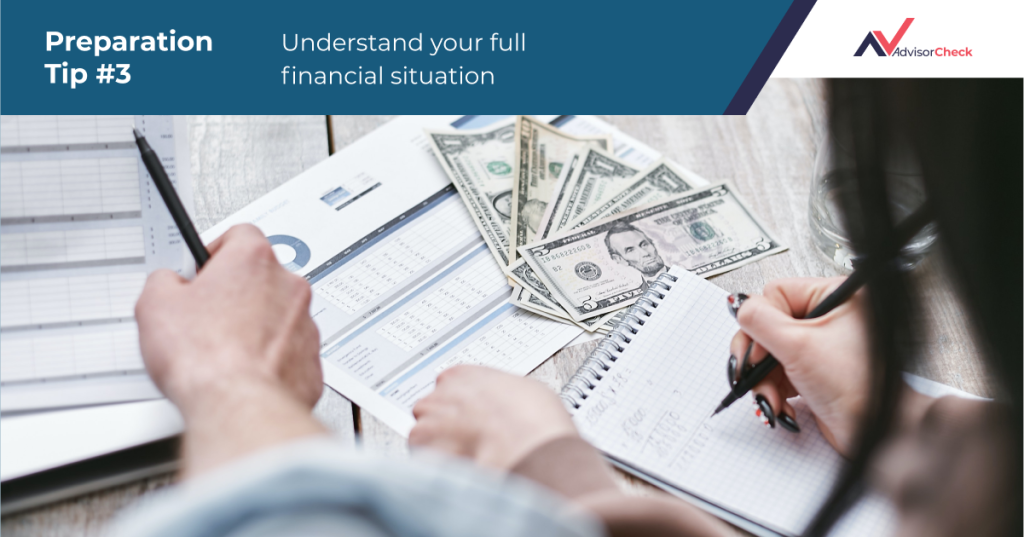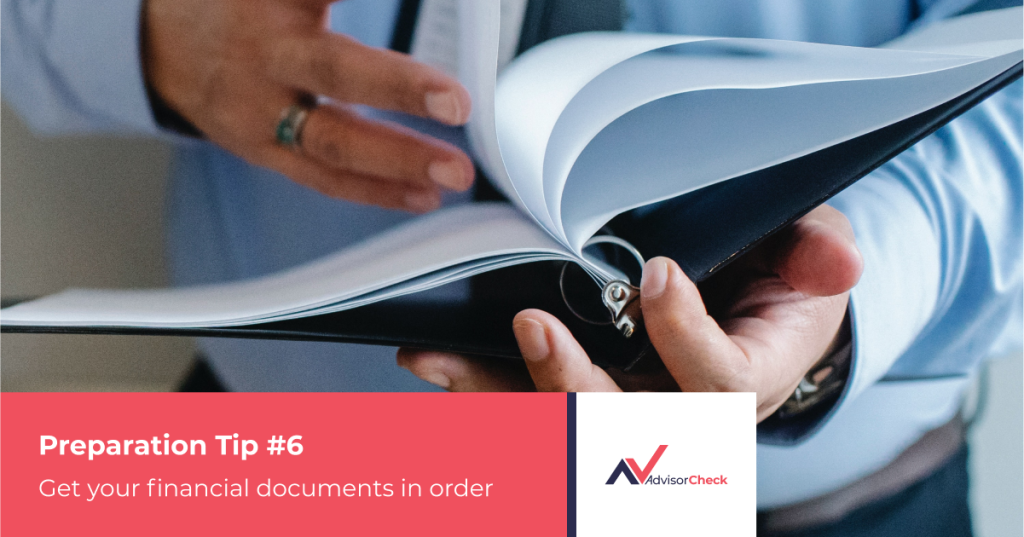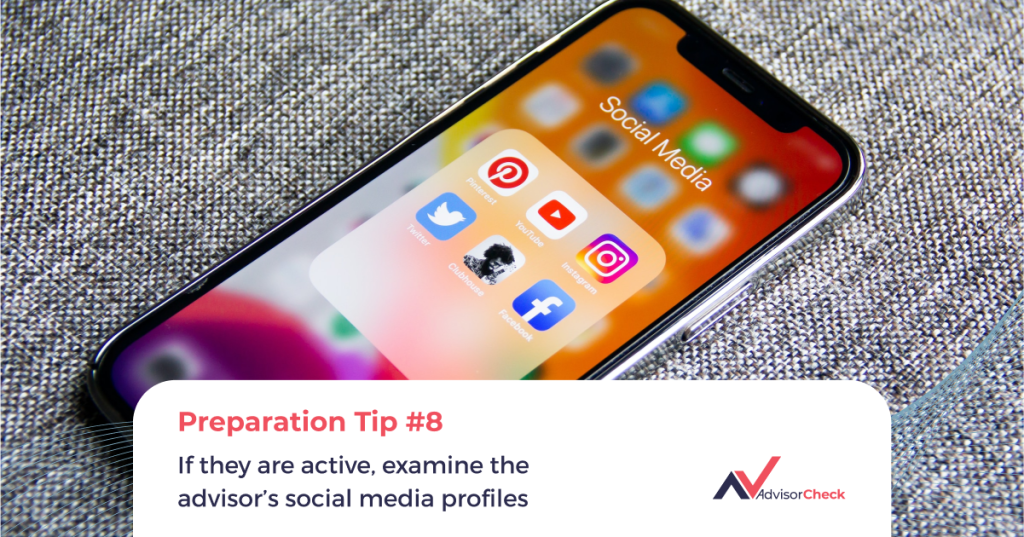
5 Questions You Should Be Asking Your Prospective Financial Advisor Right Now (and How to Prepare for the Meeting)
Have you asked your financial advisor these five key questions yet? If not, we recommend scheduling a meeting to do so ASAP. If you’re unsure how to prepare for this meeting, we’ll also explain how to plan effectively so that you can get the most out of it.
If you’ve taken the time to consider that one of the most influential decisions that you will ever make when it comes to the financial health of your future is to start working with a financial advisor, then congratulations. You will be able to set your financial future off to a much better place than your peers who aren’t working with financial advisors themselves.
Working with a financial advisor will give you an edge, and that opportunity will not go to waste. It’s one of the most crucial decisions you could make, but the other challenge becomes which advisor you end up working with. Many people make mistakes when they set off on the path to pick an advisor, some more costly than others. There are many reasons you may choose to not hire the financial advisor that you meet. That being the case, it’s important to figure out which questions will help you determine whether or not the financial advisor you plan to meet with is the right one to work with in the long-term.
How you go about choosing a financial advisor should be similar to that of which you use to determine a spouse. You can just go by beauty or earning power alone, or when push comes to shove, you could end up in a tumultuous relationship that could ultimately lead to divorce. The same holds true when it comes to picking a financial advisor to work with, so you need to enter into the meeting with the right questions prepared for the meeting.
“When you meet with a prospective financial advisor, you have to look at the relationship in its entirety, not just from how your finances are treated, but that of your spouse and children, or future spouse and children as well,” says Leonard Kim of AdvisorCheck. “You also have to take a comprehensive look at a financial advisor’s background as well. There are so many instances where a person may end up working with a financial advisor that may have had a disparaging track record, when that could’ve ultimately been prevented up front. This working relationship is just as important as a marriage or a business partnership, so make sure you take the time to carefully select which advisor you end up working with.”
Issues like the nature of your financial advisor’s investment philosophy, whether they have any disclosures on their record and which organization is acting as their independent custodian (among others) are absolutely essential to iron out when you’re placing your trust in someone to responsibly manage your wealth and investments.
That’s why, if there’s any uncertainty about the answers to the crucial questions on this list, it’s time to schedule a meeting with your financial advisor and start planning what concerns you’ll need to cover. Here are five of the most important questions to get to the bottom of immediately.
5 Questions You Should Be Asking Your Financial Advisor Right Now
Question #1. “How do you plan to help me attain my (insert goal here: [first home, second home, luxury car, vacation for a year, early retirement aspirations, future healthcare needs, children’s college tuition, plans for transferring generational wealth])?”
![What You Should Ask Your New Financial Advisor Question #1: “How do you plan to help me attain my (insert goal here: [first home, second home, luxury car, vacation for a year, early retirement aspirations, future healthcare needs, children’s college tuition, plans for transferring generational wealth])?”](https://cms.aimranalytics.com/wp-content/uploads/2023/01/Question-1-1-1024x538.jpg)
If you tell your financial advisor what your goals are, more often than not, they will need to share their investment philosophy with you in order to guide you down the path of how they will be able to help you achieve the goals that you have set forth for yourself and your family. The investment philosophy of that of your advisor should match the same levels of risk you are comfortable with in achieving your goals, whether achievable or lofty. If they are quite achievable with what you currently earn, you will be able to see if their conservative investment philosophies are a match for your overall risk level, but on the contrary, if they are lofty, you may either need to adjust your goals to your income or work with a more conservative type of strategy that is within your meals.
When a financial advisor gets a basic understanding of what your goals are, the more likely they are to make decisions and give advice that is suited to your needs and goals. Usually, this conversation will bring up the topic of investment philosophies as well, so both parties can ensure that they are on the same page when it comes to the amount of risk involved in achieving these goals. If you come to find that you have loftier goals than what is achievable within your financial scenario, you may want to tone down your level of risk to a level you are more comfortable with, and you will also be able to see what levels of risk your advisor carries with their recommendations as well, to see if they are best suited for your investment style.
According to Alice Finn, who founded PowerHouse Assets and wrote an inspiring guide to investing for women called Smart Women Love Money, sharing an investment philosophy with your financial advisor is a must because “you have to believe in what they’re doing to stick with it.”
Relatedly, Finn also points out that “when financial advisors really do their job is when the market is down and they can convince you to stick to the same page,” preventing you from making the rash decision to sell when a market cycle has reached its lowest point. This type of support is most effective when you know that you and your advisor have similar goals for your portfolio as well as a shared philosophy shaping your strategies for working toward those goals.
Question #2. “How are you paid?”

This is another question that, ideally, you’d know the answer to before you decide to hire a given advisor. But the next best thing is to ask your advisor how they receive payment for their services today.
According to MarketWatch, your best bet in terms of payment would be to find a fee-only financial advisor. This means that your advisor doesn’t receive commissions or any other monetary compensation from the financial institutions that produce the financial products they are recommending. Instead, their source of income in their capacity as financial advisors is their clients, minimizing the chances of any unsavory financial incentives biasing their recommendations to you.
If you’re working with a fee-only financial advisor, there are a number of payment schemes you might use: hourly payment, flat fees, or a percentage of the total assets that are under your advisor’s management.
Katie Brewer, a certified financial planner who founded the Dallas financial advisory firm Your Richest Life, reiterates exactly why understanding how your advisor makes money is essential: “It’s important to know how people are compensated so you can look out for red flags such as self-serving advice (e.g. garnering a commission when they buy or sell certain securities) vs. making the best choice for your situation.”
If you are talking with a financial advisor and their fees only make sense for them to earn money with your investment of hundreds of thousands, or millions of dollars you might not have, it is also good to consider what service based fees they may charge to help you with other important tasks, such as creating and managing one’s personal budget. Financial advice that is applicable to one’s life and has a direct impact on your day to day activities is going to be worth just as much, if not more, than what one would find from the investment side alone.
Question #3. “Can you provide any client references?”

Don’t be afraid to ask your advisor for client references – they’re a great way to gain some insight into other clients’ experiences working with your advisor. Clients who’ve been working with your advisor for an extended period are an especially helpful source of knowledge. They can let you know whether your advisor’s investment philosophy, strategies and advice have been beneficial. Before you call or email any references, you may want to come up with a list of specific questions to ask them.
Some questions could include:
How quickly does your financial advisor respond to your questions?
If you have a concern with how an investment is performing, what do they do about it?
Overall, how many years have you seen your portfolio meet or exceed your expectations?
Was there any unique situations that you never thought about that your financial advisor helped you with – that helped you out immensely in an area you didn’t know about?
How proactive is your financial advisor when it comes to finding opportunities to grow your portfolio?
Question #4. “Are you a fiduciary or can you act in a non-fiduciary capacity also?”

A fiduciary is a professional who manages another person’s assets and who is legally obligated to prioritize the best interests of their client (also known as the “beneficiary” or “principal” in a fiduciary relationship) over their own financial benefit. Importantly, Forbes Advisor notes that “fiduciary duty is a serious obligation. If a fiduciary doesn’t fulfill their duties, called a breach of fiduciary duty, the beneficiary could be entitled to damages.”
Its important to also understand that many financial advisors can potentially wear multiple hats. In the example of a dually registered advisor (both IAR and RR) they can wear a fiduciary hat in one scenario and a non-fiduciary hat in another. This is not necessarily a conflict of interest, but something to be aware of when working with someone who can wear multiple hats.
In other words, confirming that your financial advisor is a fiduciary means confirming that they are legally obligated to put your interests before their own – a relationship enforced by the possibility of negative consequences if your advisor fails to fulfill that responsibility.
Many of the certifications awarded to financial advisors come with the guarantee that they are a fiduciary, so be sure to check what kind of certification your advisor has. Professional certifications that indicate your advisor is bound to fiduciary duty include:
Few people are aware that financial advisors help you with more than investments, but help you find HUGE tax breaks that could help you achieve your financial goals at a MUCH quicker rate.
Use AdvisorCheck to find the best financial advisors near you.
Question #5 “What happens to you?”

Like in the event of a death or disability? Your financial advisor will have an intimate relationship with you and your family. They will know your nuances and understand the things you say may not be what you intend. There truly is a long term relationship being developed here and you want to ensure continuity in the event something unfortunately does happen in your life that leaves your household is disarray.
Many financial advisors these days are teaming up or forming ensembles to help provide a multitude of services to their clients (like a family office) or are creating teams to provide continuity and additional support to their clients.
If you are working with a more experienced advisor, this is an important question to ask in order to ensure you and your family have continuity and assurance in the future.
9 Ways to Plan for the Meeting With Your Financial Advisor
Once you’ve figured out what you need to ask your financial advisor, here are 9 ways you can thoroughly prepare for this meeting and ensure that you get the most useful information you can in the process:
Preparation Tip #1. Prepare a list of questions so you don’t forget anything

Refer to our list of five essential questions to ask your financial advisor, above, for some initial inspiration. But once you start planning and doing research, even more questions might occur to you in the process. We’d recommend starting off by writing all of these questions down as they arise (obeying the edict that “there are no stupid questions”). Then, at the end of the planning process, go back and cull the less important/salient questions, as well as any questions you can easily answer on your own with a bit of research.
Preparation Tip #2. Conduct due diligence on the advisor’s background

According to Michael Reid, a CFA with Exchange Capital Management in Ann Arbor, you can conduct basic advisor due diligence in less than 15 minutes as the process is relatively straightforward.
Start by running an in-depth background check using our AdvisorCheck search tool. You’ll receive a detailed report on your financial advisor consisting of their “registrations, legal records and personal conduct.”
AdvisorCheck is a great tool to rule out major red flags and attain peace of mind about the trustworthiness of your advisor, especially because it can locate truly hard-to-find information. AdvisorCheck can even notify you of new events, like if your advisor files for bankruptcy or if their record gains any new disclosures while you’re working with them.
Most experts would advise you to use an advisor’s Central Registration Depository (CRD) number and their firm’s Investment Advisor Registration Depository (IARD) number to search the SEC’s Investment Advisor Public Disclosure website to view their firm’s Form ADV. These include tons of useful info, such as potential conflicts of interest, financial industry affiliations, direct owners and executive offices and disclosures. In some instances, the Form ADV could be over 100 pages long. However, AdvisorCheck provides this information in the platform itself and condenses it down to only the most valuable information that you would find useful when making a decision to work with a new financial advisor.
Disclosures will be of particular interest. According to Liz Smith for Yahoo Finance, a disclosure is “any past regulatory, criminal or disciplinary actions on a firm or advisor’s record,” which can be found in Form ADV (the form that investment advisers file to register with the SEC and their state securities authorities). Disclosures typically include a description of the allegation itself as well as its resolution and the penalties that the advisor might have received.
Not all disclosures are serious. They “can range in severity and include issues like customer complaints, arbitration and civil proceedings, sanctions and terminations,” says Smith, so don’t automatically panic if you see a disclosure on your advisor’s record. You should first check to see what the nature of their offense was, to make a reasonable assessment of its severity.
Finally, research their professional certifications to assess whether they’re meaningful and actually indicative of education and skill. In addition to making sure that their credentials’ sanctioning body has actually awarded them these credentials and that they remain in good standing, Reid recommends that you ask three key questions about the certifications you’re assessing:
- “Does the designation require a 4 year college degree?”
- “Is there a rigorous multi-year preparation, testing, and work experience requirement?”
- “Once the designation has been earned, is there a continuing education component?”
Reid’s advice is a great place to start when it comes to establishing a baseline of trust via basic due diligence.
Preparation Tip #3. Understand your full financial situation

In general, you are best prepared to meet with your financial advisor when you arrive at meetings with a strong understanding of your financial situation – both the good and the bad. But how do you do this?
You can assess your financial situation yourself by doing an “audit” of these seven areas, writes Rob Berger (host of the Financial Freedom Show):
- Your net worth (that is, your liabilities subtracted from your assets)
- Your debt levels
- Retirement planning
- Credit score
- Savings
- Education planning
- Investments
Preparation Tip #4. Set your goals for the present and future

The SEC’s Investor.gov website just about summed it up: “You don’t have to be a genius to [secure your financial well-being]. You just need to know a few basics, form a plan, and be ready to stick to it.”
One of the most important ways to achieve the future you desire is by asking yourself what your life priorities are – what goals are most important to you, and how soon do you hope to achieve them? Your financial advisor can help you figure out realistic roadmaps and timelines for achieving these goals, so keep in mind that your plans don’t have to be set in stone before you meet with your advisor.
We empower new and seasoned investors to take charge of their finances.
Get the most reliable financial resources delivered straight to your inbox.
Preparation Tip #5. Consider the financial needs of your family

Unless you’re a single individual with no children, all of your plans and your reflections on your priorities should account for the needs of your family. (And if you are single, one of your goals may very well be to have a family, in which case your financial goals should absolutely account for your future family – so this advice will likely still apply.) Accounting for your family’s financial needs definitely means including your spouse in financial discussions, and may also mean planning for things like:
- Establishing an emergency fund
- Purchasing a life insurance and/or disability insurance policy
- Planning for the high costs of having children (raising a child costs an average of $17,000 per year until they turn 18, which is a total of about $310,000 per child)
- Writing a living will
- Saving up for your children’s educational costs using a tax-advantaged 529 plan
Preparation Tip #6. Get your financial documents in order

The process of organizing your financial documents could be a blog post in itself – depending on how much material you have (physical or virtual), filing alone can be a seriously intensive process. However, having a strong organizational system for your financial documents is essential to being as informed as possible about your own financial situation both past and present. You also want to be able to provide your advisor with any documents they might request of you without scrambling and struggling to find them at the last minute.
Here are the most common documents that relate to your financial health:
- Checking and savings accounts
- Credit cards
- 401(k)s and IRAs
- Brokerage accounts
- Student loan accounts
- Car loan
- Mortgage
- Medical debt
- Auto insurance
- Home/renter’s insurance
- Life insurance
- Taxes
Preparation Tip #7. Understand your strengths and weaknesses

What are you good at, financially, and in what areas could you stand to improve? Perhaps you’re good at making savvy investment choices, but you could use some advice and support when it comes to spending less and saving more, establishing and sticking to a budget or any number of other wealth management skills. If possible, make a list of your strengths and another list of your weaknesses, and reflect on how your financial advisor might be able to help you resolve the latter.
Preparation Tip #8. If they are active, examine the advisor’s social media profiles

Many financial advisors regularly post on social media platforms like Facebook, Instagram, Twitter and LinkedIn, among others. (You might even find your advisor on TikTok, although this one is a bit less common because the app skews quite a bit younger than the others.)
Advisors use social media to advertise their services and connect with new clients, so their public-facing pages are likely to offer some insights into their personalities and priorities. According to CFP Douglas Boneparth, founder of Bone Fide Wealth in New York City, “If they’re sharing their opinions and takes, you can get some insights into what it would be like to work with them.”
Preparation Tip #9. Don’t be afraid to ask tough questions

We understand that asking your advisor probing questions about their history, certifications and more can be a challenging experience. If you didn’t ask these questions before you hired them, this might even be why you avoided doing so. But asking tough questions could mean the difference between working with a trustworthy professional and someone with a less-than-stellar ethical track record.
If you have any questions about your financial advisor’s credentials, philosophy, conduct history or anything else, take the time you need to prepare for your meeting with your financial advisor. Then head into the meeting with your advisor with your list of questions and all the materials and research you’ve prepared to have a supremely productive discussion and leave more informed – and hopefully with peace of mind regarding the management of your assets.
Written by Billy Quirk
Fact checked by Luke Jara
Reviewed by KJ Kim
Disclosure
The information provided in this article was written by the research and analysis team at AdvisorCheck.com to help all consumers in their financial journeys, by providing the resources and the insights to help improve one’s financial health, make it through recessionary and inflationary periods of time, and save their earnings to use them towards building a secure financial future.
Unauthorized reproduction or use of this material is strictly prohibited without prior approval. Any parties interested in content syndication, references, interviews, or PR, please contact our marketing team at marketing@aimranalytics.com
AdvisorCheck.com is an independent data and analytics company founded on the principles of helping to provide transparency, simplicity, and conflict-free information to all consumers. As an independent company providing conflict-free information, Advisorcheck.com does not participate, engage with, or receive funding from any affiliate marketing programs or services. To become a free AdvisorCheck member, visit advisorcheck.com/signup.
Most read
Subscribe to our newsletter
Get the latest on finding, evaluating, and working with financial advisors; delivered right to your inbox.

The content of video and blog articles are for informational and entertainment purposes only and do not constitute investment, tax, legal, or financial advice. Always consult with a qualified professional before making any financial decisions. The views expressed are those of the author and do not reflect the opinions or recommendations of any affiliated entities.